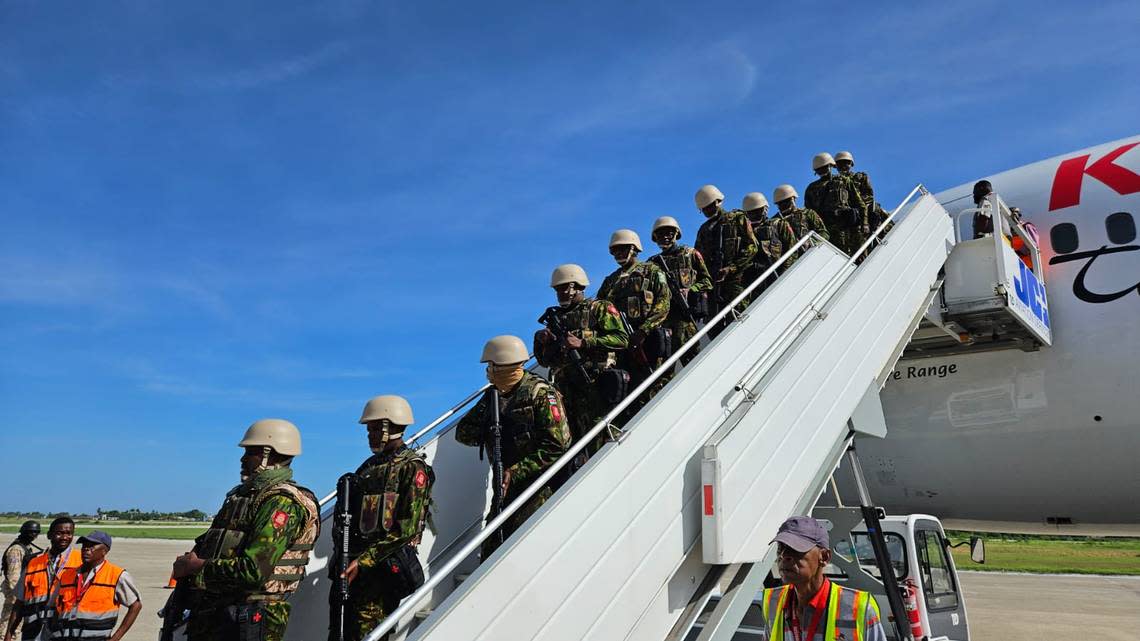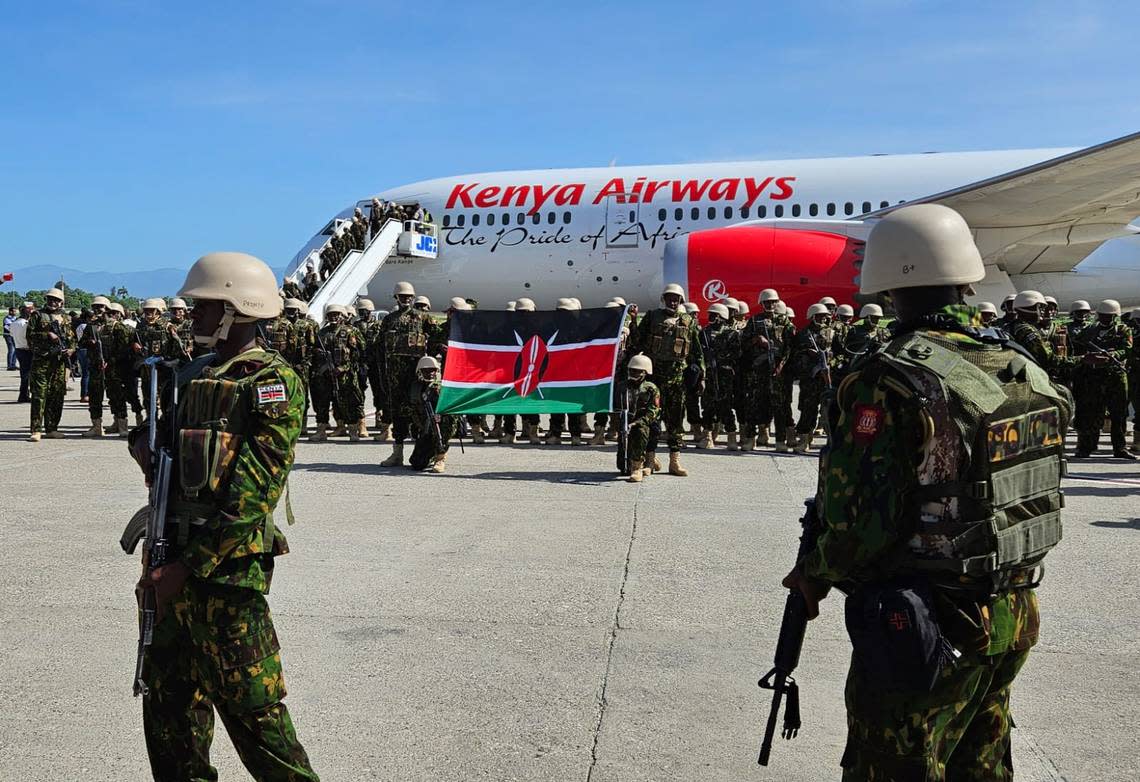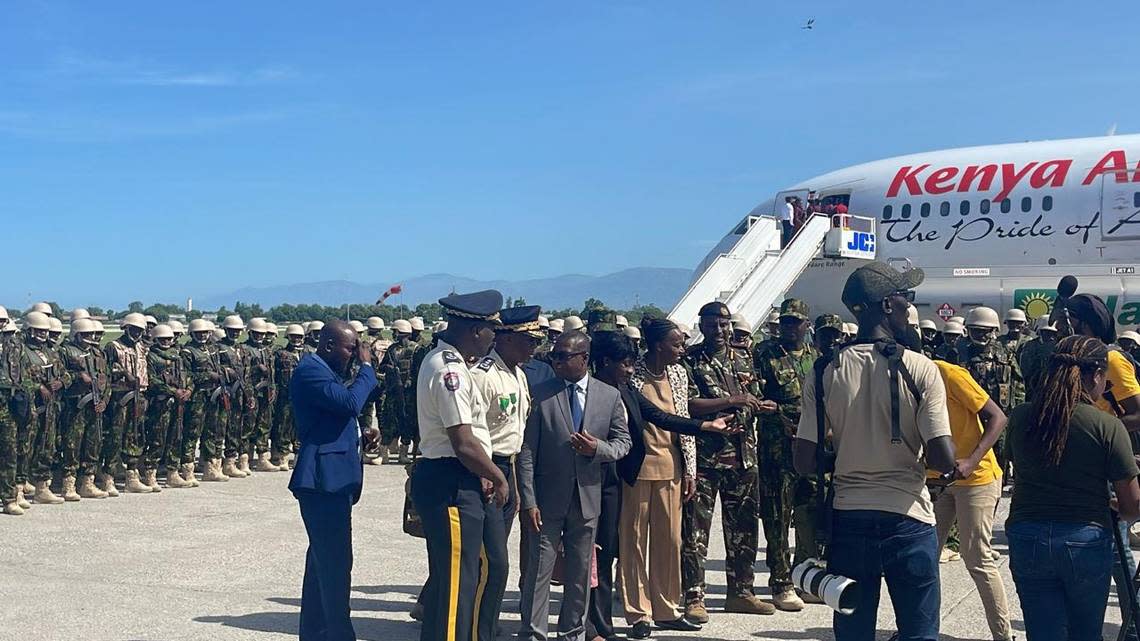‘Lay down your guns,’ Haiti’s prime minister tells gangs as Kenyan forces arrive
A Kenyan Airways flight landed at Toussaint Louverture International Airport early Tuesday with the first contingent of an international armed security mission, viewed as a vital step in helping Haiti combat deadly criminal gangs to restore security.
The 200 specialized Kenyan officers and their support staff were greeted on the tarmac by members of the Haiti National Police, who have long awaited the force’s arrival to help them dismantle armed groups that now control more than 80% of the capital and parts of the Artibonite region, two hours to the north.
The Kenyans, who are assigned to several terrorist-fighting elite forces in the East African nation, were accompanied by National Security Adviser Monica Juma. She later described the touchdown on Haitian soil as a sign of her nation’s mission “to serve as agents of peace, stability and hope” and “commitment to support the Haitian national police to restore public order and security, to build bridges between our people and nations.”
As the 240-seat Boeing 787 aircraft taxied the runway, even airport workers could be heard calling out gang members by name and warning, “We’re coming for you.” The Kenyan cops, donning camouflage uniforms and white helmets, soon descended the stairwell as other officers waved their nation’s flag.
Before being whisked away in waiting buses to their nearby base of operation on the airport’s grounds, the Kenyans performed a brief military drill and then a dance. Haitians, confused, responded with chants, “They have to go fight the gangs not dance at the airport.”
The reinforcements have arrived during what seems at least a brief break in four months of rampant violence and attacks in and around the capital city. Though heavy gunfire could be heard around the city of Tabarre on Sunday afternoon, many gang members seem to have gone underground, at least for the moment.
Speaking directly to the estimated 200 to 300 armed gangs currently running amok throughout Haiti, Prime Minister Garry Conille later took on an aggressive stance telling armed groups that he and his fellow leaders, who are part of the country’s new political transition, are determined to relieve the suffering of the Haitian people. Together with Kenya and Haiti’s other partners, Conille said, they were determined to restore security in order to relaunch the country and forge a path so that elections can be held as soon as possible.
“This is the time for all of those who have been creating chaos and havoc to become conscious of their actions,” he said during a joint press conference with Juma at the Office of the Prime Minister. “The state will take its responsibility to reaffirm itself so that people can resume their activities and go about their lives regardless of where they are in the country. ...We are going to start working slowly to retake our country without major fights — unless it is necessary.”
Listing the gangs recent attacks against police stations, hospitals, schools and their release of over 4,000 prisoners who remain at large, Conille said the Haitian people are tired. He is also certain the bandits are to, he said, declining to say whether he would accept a request by one of the gang leaders, Jimmy “Barbecue” Chérizier, for a dialogue.
“Lay down your guns, recognize the authority of the state and then we’ll see,” he said.

Haiti has seen several foreign interventions in its recent history. However, this marks the first time that such a force is being led by an African nation. The Kenyans arrival no doubt is a step forward in helping the country find a way out of its crippling security crisis, bit while it gives a veneer of change, the plan remains untested.
Authorized for a year by the United Nations Security Council in October, the Multinational Security Support mission, known as the MSS, is expected to have about 2,500 personnel at full strength and cost about $600 million a year, though the Biden administration has estimated lower costs. With its start delayed by nine months, its future will be discussed next month when U.N. Secretary General António Guterres is expected to address the council about the situation in Haiti and the mission.
Juma said she believes that “as long as there is a need for the mission,” it will be supported but it is their hope that it doesn’t become a permanent mission.
“We must solve this matter and hand over to functioning institutions in Haiti,” she said. “That is the end state we’re looking for as soon as possible.”
As for the mission’s delay, Juma said the reasons are because of the mission’s uniqueness, which required several months of developing the fundamental documents defining the mission.
In welcoming the arrival of the first Kenyan contingent to Haiti, Guterres on Tuesday reiterated his appeal to member states of the United Nations Security Council for financial support for the mission so that it could successfully implement its mandate. A trust fund managed by the U.N. for the mission has so far amassed only $21 million in contributions.
President Joe Biden also welcomed the Kenyans’ deployment to help Haitian police stabilize the country, and ensure that humanitarian assistance reach those in need. The president said he was “deeply grateful” to all of the countries that have pledged personnel and financial support to the mission. So far, they number 15 nations with seven of them volunteering to field security personnel to the police-led mission, and the others providing funds that are still far short of the mission’s estimate cost. The United States, which pledged $300 million, remains the biggest financial contributor to date.
“The people of Haiti deserve to feel safe in their homes, build better lives for their families, and enjoy democratic freedoms,” Biden said, noting that rampant gang violence has killed thousands of Haitian women, men and children in recent years. “Haiti’s future depends on the return to democratic governance. While these goals may not be accomplished overnight, this mission provides the best chance of achieving them.”

Biden has previously said that U.S. troops will not participate in the mission. The United States, however, has been the main supporter, writing the United Nations Security Council resolution along with Ecuador, mandating the international armed force, and lobbying foreign governments to volunteer personnel and provide urgently needed funding.
After the deployment was delayed last month because a security assessment team from Nairobi found several key equipment missing, the administration decided to go ahead and override a Republican block on funding and authorized $109 million so that the mission could get off the ground. Biden has also used his executive power to get $70 million in weapons and other equipment to both the Haiti National Police and the multinational security support mission, whose main task will be to support the police in its anti-gang operations.
“Haiti is an extraordinary country, and the people of Haiti deserve what people everywhere deserve: security, opportunity, and freedom,” Biden said. “We are enriched by Haitian immigrants and Haitian Americans’ contributions. The United States has and will continue providing significant security, humanitarian, and economic development assistance, including my Administration’s strong support for trade preferences with Haiti.”
Protests back in Kenya
The contingent’s arrival coincided with a third day of deadly and chaotic protests in Nairobi, Kenya’s capital, where youth are demonstrating against new taxes. On Tuesday, protesters stormed Parliament and some were reportedly shot by police who have been accused of using live bullets. During the demonstrations, some protesters chanted at police in Swahili, “Tunawapigania sote tukule”—We are fighting for all our rights, (including the police); “Tunafight msiende Haiti..” —We are fighting so that you (the police) don’t go to Haiti.”
Kenyan President William Ruto’s decision to lead a foreign intervention into Haiti has been both controversial and contentious at home, and in the Haitian diaspora, where some continue to oppose the idea of foreign boots on Haitian soil even as armed groups fuel one of the worse humanitarian and economic crises in recent memories.
In the last three years alone, the violence has forced nearly 580,000 Haitians from their homes and is currently fueling the worst hunger crisis since Haiti’s devastating 2010 earthquake. Nearly half of Haiti’s 12 million people are struggling to find enough food to eat, and over a million are at risk of famine, the World Food Program has said.
Stéphane Dujarric, spokesman for the U.N. secretary-general, said on Tuesday that while the recent resumption of commercial flights at the Port-au-Prince international airport are more than two months has allowed aid organizations to airlift medicine, goods and other equipment that are critical to the emergency humanitarian operations,humanitarian needs remain high in the capital and across the country.
“For example, UNICEF says it is concerned about the living conditions of some 33,000 people who have been displaced from the capital to Leogane, a city about 40 km from Port-au-Prince,” Dujarric told journalists in New York, adding that of the $674 million Humanitarian Response Plan for Haiti the U.N. launched, just 23.5% or $158 million has been funded.
Already this year, more than 2,500 Haitians have been killed or injured by armed gang violence, according to the U.N., including 11 people who were massacred earlier this month when a ruthless gang attacked their farming communities in the upper Artibonite region. All of this has placed a lot of hope on the mission, whose ability to help Haiti tackle gangs very much depend on its rules of engagement, which have yet to be made public.
The arrival of the specialized police officers from Kenya comes more than 20 months after the Haitian government, then led by Prime Minister Ariel Henry, first requested the international community’s help and nearly a year after Ruto volunteered to answer the call by sending 1,000 of his elite cops to lead a Multinational Security Support mission.

Since then, however, it has been an uphill battle to get the mission off the ground. Opposition groups in Kenya have opposed the deployment and filed several legal challenges to block it, including one currently in the courts. Republican leadership in Washington also blocked a funding request by the Biden administration, which has supported equipment, training and the construction of a base of operation at the airport.
Another blow came with the leadership change in Haiti after armed gangs united and launched a broad assault on key government infrastructure in late February while Henry was in Nairobi signing a security agreement to allow the deployment to occur.
READ MORE: Biden administration overrides GOP, authorizes $109 million for Kenyan force for Haiti
Shortly after he was forced by Washington to resign and days later, U.S. Secretary of State Antony Blinken flew to Jamaica where the U.S. and members of the Caribbean community helped broker a new political transition in Haiti on March 11. The transition is headed by a nine-member presidential council, whose mandate is supposed to end in February 2026 when a newly elected president and parliament are supposed to take office.
Tasked with finding a replacement for Henry and putting in place a new government, the new transitional leadership has been readying Haiti for the arrival of the U.N.-backed mission. Despite Tuesday’s deployment, however, the security mission still has yet to share its rules of engagement with the Security Council, a step that is necessary to make it official. So far, only two agreements have been signed for now between Haiti and Kenya.
On Monday, prior to the officers’ departure, Ruto handed each of them a Kenyan flag, and reiterated his commitment to the mission. In all, 400 of the 1,000 Kenyan police officers had been vetted for the mission by the U.S. Those yet to be deployed will be sent to Haiti as part of a phased deployment that will also consist of police from six other nations including Jamaica, Benin, Chad and Bangladesh.
McClatchy writer Michael Wilner contributed to this report.
